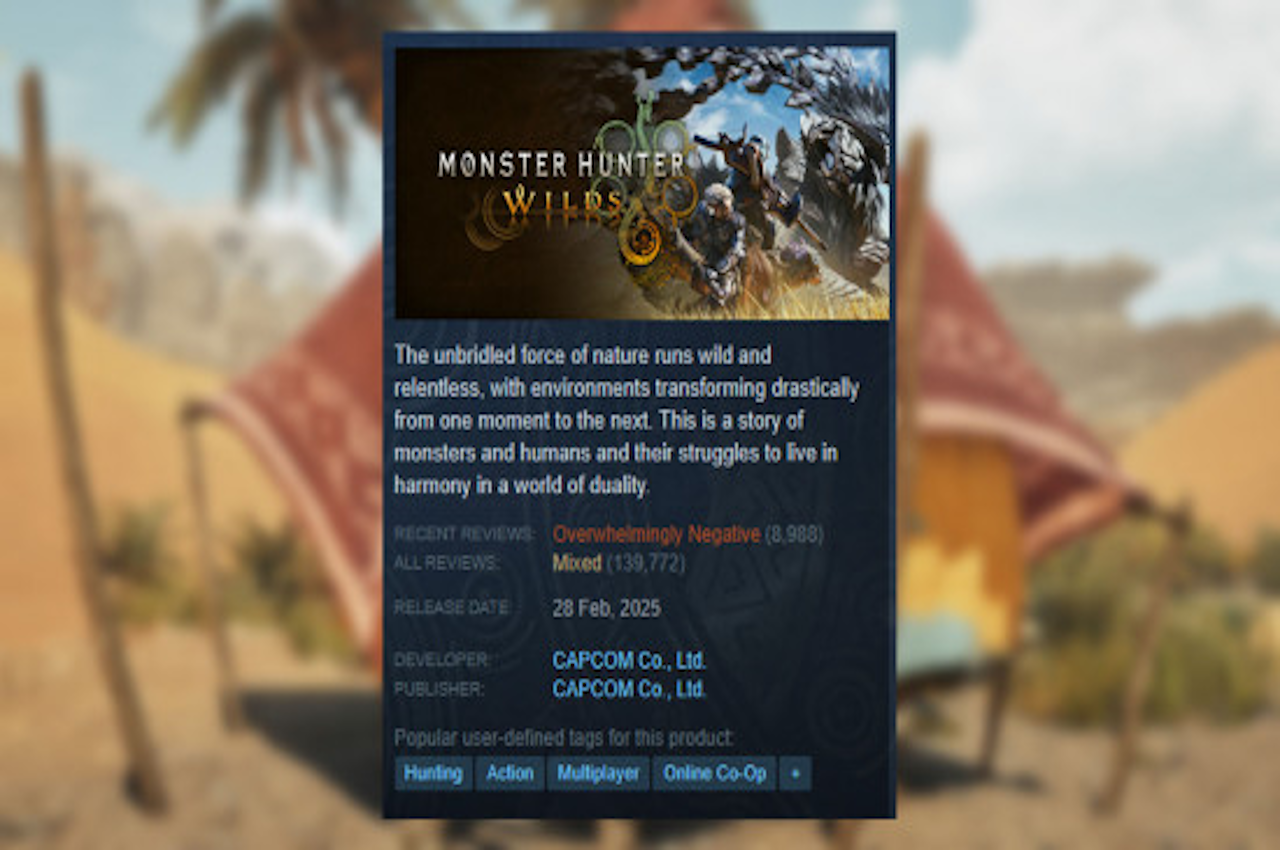The highly anticipated open-world title, Monster Hunter Wilds, the latest installment in Capcom’s incredibly popular monster-hunting series, is currently facing a significant and concerning backlash from its player base on Steam.
Released just four months ago, the game’s recent review scores have plummeted, reaching an alarming “Mostly Negative” overall rating. This sharp decline in player satisfaction raises serious questions about the game’s current state and Capcom’s approach to its PC port.
The severity of the situation is further highlighted by a striking comparison: 2018’s Monster Hunter: World, an older title from the same franchise, currently boasts more concurrent players than Wilds. This unexpected turn of events indicates a fundamental disconnect between player expectations and the delivered product. For a new, major release in a beloved series to be outperformed in active player count by its predecessor, years after its launch, signals deep-seated issues that are driving players away. The core problem, as articulated by the frustrated community, appears to stem primarily from severe technical deficiencies, overshadowing other aspects of the game.
The Root of Discontent: Performance Woes Plague Wilds
Player feedback overwhelmingly points to critical performance issues as the primary reason for Monster Hunter Wilds’ negative reception.
Unoptimized Experience: Frame Rate Drops and Crashes
The overwhelming consensus among the negative reviews for Monster Hunter Wilds centers on the game’s severe performance issues. Players are reporting a widespread lack of optimization on Capcom’s part, leading to a frustrating and often unplayable experience. These technical deficiencies manifest in several critical ways that severely impede gameplay.
One of the most frequently cited complaints involves drastic frame rate drops. This means that even players with powerful gaming setups are experiencing inconsistent and choppy visuals, with the game’s frame rate dipping significantly in various scenarios. For a fast-paced action RPG like Monster Hunter, stable frame rates are crucial for precise combat and enjoyable exploration.
Beyond just choppy performance, many users are also reporting frequent game crashes. These crashes can occur unexpectedly, leading to lost progress, frustration, and a complete disruption of the gaming session. The instability is a major deterrent, making it difficult for players to immerse themselves in the open world or commit to longer hunting expeditions. As one exasperated reviewer vividly described, attempting simple in-game actions can trigger these problems:
“Moving your camera to that area of the camp? Too bad, 12FPS for you. Asking Gemma to make you a new weapon? Here are some game freezes and UI glitches instead.” This highlights how even seemingly innocuous interactions can trigger severe performance degradation, fundamentally breaking the player experience. The pervasive nature of these technical faults suggests a deeper problem with the game’s engine or its optimization for PC hardware configurations.
The Unfavorable Comparison to Monster Hunter: World
The performance issues in Monster Hunter Wilds become even more glaring when compared to its highly successful predecessor, Monster Hunter: World. Many disgruntled players are drawing direct parallels, emphasizing the stark difference in technical polish. One review poignantly states, “The fact 7 year old MH World, runs better, looks better and won’t crash, compared to this is honestly just sad.”
This sentiment encapsulates the frustration of a community that expected improvement, not regression, in a new installment. Monster Hunter: World, despite being released in 2018, is widely praised for its solid performance on PC after its initial optimization period, offering a smooth and visually appealing experience that Wilds currently fails to deliver.
The disparity in player engagement further underscores the problem. At the time of reporting, Monster Hunter: World maintained a higher concurrent player count than Wilds: 20,638 players for World compared to a mere 12,596 for Wilds. This difference is astonishing, considering Wilds is the brand-new, full-price release.
Players are actively choosing to return to an older game, with years of content and stable performance, rather than grapple with the technical frustrations of the latest entry. This exodus of players back to World highlights not only the severity of Wilds’ performance issues but also a potential lack of compelling new content or features that would otherwise retain players despite technical glitches. It’s a clear signal that the unoptimized experience is directly impacting player retention and satisfaction.
Beyond Performance: Other Criticisms Emerge
While performance is the dominant complaint, other elements of Monster Hunter Wilds have also drawn criticism from players, contributing to its negative reception.
Control Issues and Perceived “Dumbing Down”
Beyond the pervasive performance issues, some negative reviews for Monster Hunter Wilds have also levied criticisms against the game’s fundamental design choices. A portion of the player base has expressed dissatisfaction with the game’s controls, finding them less intuitive or responsive than previous iterations in the series.
In a game where precise movement and timing are paramount for successful monster hunting, clunky or unresponsive controls can significantly detract from the experience, leading to frustration and perceived unfairness during challenging encounters. This criticism, while not as widespread as the performance complaints, suggests that even the core gameplay mechanics might not be resonating with all players.
Furthermore, a recurring sentiment among some long-time fans is that Monster Hunter Wilds has been “dumbed down” compared to Monster Hunter: World. This perception typically refers to a perceived simplification of mechanics, reduced complexity in monster behaviors, or a lower overall difficulty curve.
For a series renowned for its intricate systems, steep learning curve, and demanding boss battles, any move towards simplification can alienate its dedicated veteran player base. While some design changes might aim to make the game more accessible to newcomers, these changes risk diminishing the depth and challenge that core fans have come to expect and cherish. This type of criticism suggests that even if performance issues were entirely resolved, some players would still find the game lacking in the intricate gameplay loop that defined previous titles.
Content Concerns and Lack of Endgame Depth
Adding to the list of player grievances, significant concerns have been raised regarding Monster Hunter Wilds’ content offerings and endgame depth. Many players feel that the game, especially at launch and in its current state, provides a less robust and fulfilling experience compared to its predecessors. Unlike previous Monster Hunter titles, which are known for their extensive post-game activities, challenging quests, and rich progression systems that keep players engaged for hundreds, if not thousands, of hours, Wilds appears to fall short in this regard.
Players have expressed disappointment over a perceived lack of new monsters at launch, leading to a feeling of repetition sooner than expected. The excitement of discovering and mastering new monster encounters is a core appeal of the franchise, and if the variety feels limited, it directly impacts replayability. Furthermore, the endgame content has been described by some as “lacking depth and replay value.”
This means that once the main story is completed, players feel there isn’t enough compelling incentive to continue playing, whether through challenging hunts, unique gear progression, or engaging side activities. For a series built on the “long tail” of continuous hunting and progression, a shallow endgame is a critical flaw. This combination of limited monster variety and insufficient endgame content, coupled with the pervasive performance issues, further contributes to players abandoning Wilds and, in many cases, returning to the more content-rich and stable Monster Hunter: World.
Capcom’s Response and the Road Ahead
The widespread negative feedback puts pressure on Capcom to address the community’s concerns, particularly regarding performance.
Patching Efforts and Lingering Issues
In response to the growing wave of negative feedback and the obvious technical issues, Capcom has taken steps to address the problems within Monster Hunter Wilds. The developer has reportedly “put out several patches” since the game’s release four months ago. These patches typically aim to fix bugs, improve stability, and, ideally, enhance performance. Developers often release such updates in the weeks and months following a game’s launch as they gather more data from a wider player base and work to refine the experience.
However, despite these patching efforts, the ongoing stream of negative reviews on Steam clearly indicates that “serious issues still persist.” Players continue to report the same problems: persistent frame rate drops, frustrating crashes, and various visual glitches. This suggests that the patches released so far have either not been effective enough to fundamentally resolve the core optimization problems for a significant portion of the player base, or that the underlying issues are more deeply ingrained and require more extensive reworks.
The slow pace of substantial performance improvements has only added to player frustration, leading to a perception that Capcom is not adequately addressing their concerns in a timely manner. The effectiveness of future patches will be crucial in determining whether Capcom can turn the tide of negative sentiment and regain the trust of its community.
The Future of Monster Hunter Wilds on PC
The current state of Monster Hunter Wilds on PC, marked by its “Mostly Negative” Steam rating and a lower concurrent player count than its seven-year-old predecessor, presents a significant challenge for Capcom. The optics are undeniably “not a good look” for a major new release from a prominent publisher.
Players, who might be eager to experience new content and wield the “best Monster Hunter Wilds weapons,” are instead finding their immersion broken by persistent technical flaws. “Frame rate drops and texture issues can pull you right out of the game,” as many reviews attest, severely impacting the overall enjoyment.
The path forward for Capcom involves not just releasing more patches, but fundamentally addressing the core optimization issues that are alienating its PC audience. This may require more comprehensive technical overhauls than incremental bug fixes. The success of future content updates, such as potential major expansions that could introduce more monsters and deeper endgame activities, will also hinge on the game’s stability and performance.
If players cannot reliably run the game, or if the experience remains frustratingly unoptimized, even compelling new content may fail to bring them back. The situation puts significant pressure on Capcom to deliver substantial improvements and demonstrates the critical importance of a polished PC launch, especially for titles in popular, performance-sensitive genres like action RPGs. The future of Monster Hunter Wilds on Steam, and its ability to retain and grow its player base, largely depends on how effectively Capcom can rectify these deep-seated technical problems.
Critical Test for Capcom
Four months after its release, Monster Hunter Wilds finds itself in a precarious position on Steam, with its reviews plummeting to “Mostly Negative.” The overwhelming consensus from players points to severe performance issues, including debilitating frame rate drops and frequent crashes, which are actively driving players away. This technical instability is so profound that the seven-year-old Monster Hunter: World continues to attract a higher concurrent player count, serving as a stark reminder of the expectations that Wilds has failed to meet.
Beyond the critical performance problems, other criticisms regarding control schemes and a perceived “dumbing down” of gameplay, alongside concerns about limited endgame content, further contribute to player dissatisfaction. Despite Capcom’s efforts to release patches, these fundamental issues persist.
The future success and player retention of Monster Hunter Wilds on PC will heavily depend on Capcom’s ability to deliver significant and effective optimization fixes, restoring faith in a title that currently struggles to live up to the legacy of its acclaimed predecessors.








